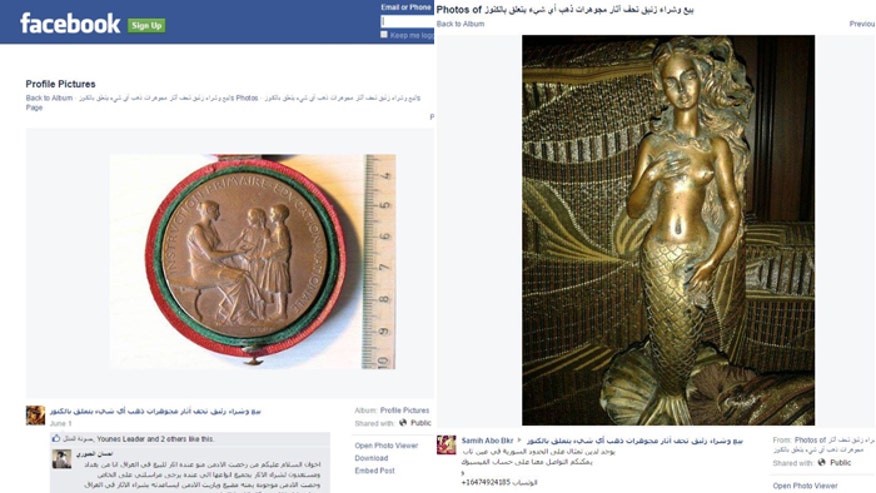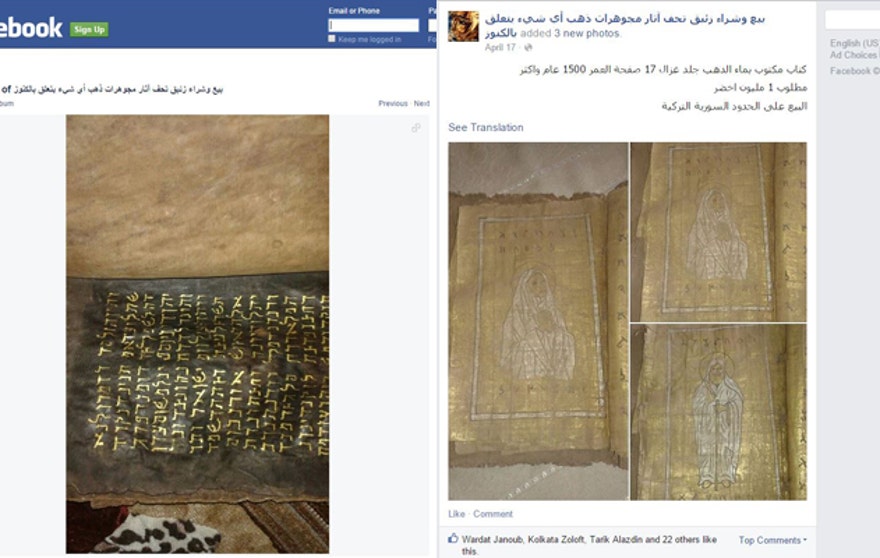
These items, believed to have been stolen by ISIS, were offered for sale on Facebook.
Facebook struck back at ISIS this week, taking down pages the terrorist army’s middlemen were using to try to sell plundered treasure and artifacts from Syria and Iraq.
The black-clad jihadist army has earned as much as $100 million selling smuggled artifacts from more than 4,500 archaeological sites throughout Syria and Iraq, many of them named UNESCO World Heritage sites, according to Iraqi intelligence sources.
“We are always on the alert for material of this type in case an attempt is made to introduce looted items into the commercial art market, and we work closely with UNESCO, Interpol and other entities to ensure any such attempts will be caught.”
– Sung-Hee Kim, Christie’s
Zaid Benjamin, a Washington-based journalist, first flagged five pages on Facebook that showed ancient artifacts, some including phone numbers and emails to contact the seller. Among the items offered were golden statues, coins, scrolls written in Hebrew and Aramaic, and clay tablets. The pages were quickly taken down.
“We may not always be able to identify artifacts as stolen, but insofar as we can when someone reports content to us, we will remove this content,” Facebook privacy spokesman Matt Steinfeld told FoxNews.com.
ISIS has ravaged and pillaged the history-rich region, using bulldozers and jackhammers and even appointing official looters who get a commission for selling items. The process has become so systematic that ISIS has created a “ministry of antiquities” to maximize profits.
Antiquities experts believe ISIS turn the plundered items over to middlemen, who take a commission after selling them on the black market.
The middlemen transport the goods mainly through Turkey and sometimes Lebanon, then offer them for sale, either through a network of unscrupulous dealers or, as in this case, online.
To help track these items and to prevent their sales and distribution in the West, the International Council of Museums (ICOM), has issued an urgent “red list” to identify these antiquities on the black market.
The list instructs museum, customs and police officials in how to recognize stolen artifacts.
In addition to the red list, Christie’s, the renowned auction house headquartered in New York with 32 locations worldwide, said it uses databases and other resource lists in order to ensure this process, including forging relationships with vendors in other countries.
Facebook took down at least five pages believed to have been used to sell stolen artifacts.
The United Nations Educational, Scientific and Cultural Organization (UNESCO) has been working to prevent these items from entering the private art sector.
“We are always on the alert for material of this type in case an attempt is made to introduce looted items into the commercial art market, and we work closely with UNESCO, Interpol and other entities to ensure any such attempts will be caught,” said Sung-Hee Kim, communications liaison at Christie’s, who said to date, the auction and art house has not encountered any such items.
Still, American imports of ancient artifacts from the Middle East and North Africa have increased dramatically between 2011 and 2013, raising questions about how these items end up on the Western art market, said cultural heritage attorney Rick St. Hilaire.
According to Kim, Christie’s has a policy of not accepting items for sale without a legitimate signed title confirmation. In addition, they require provenance pre-dating the year 2000 as well as pre-dating any periods of significant conflict.
ISIS’ goal is to erase any pre-Islamic history and, in the process, the terrorist organization has desecrated cities like Mosul, Nimrod and Hatra in Iraq and, more recently, captured the Roman city of Palmyra in Syria.
Lisa Daftari is a Fox News contributor specializing in Middle Eastern affairs.



